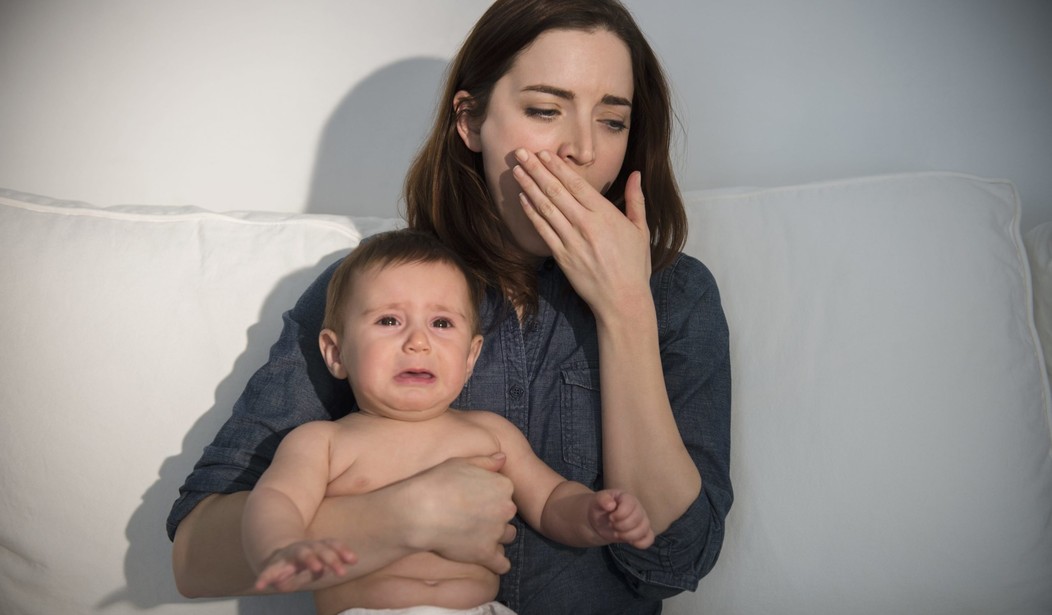Recently I was talking with a friend who is home on maternity leave with her first baby. Since she’ll be returning to work in a couple of months, the conversation eventually turned to daycare. When I could sense the reluctance in her voice I remarked sympathetically, “It is very, very hard.”
“What do you know?” she shot back rather bitterly. “You never went back to work.”
Actually, I clarified, I never stopped working. Such is the life of a freelancer, one of many roles our culture fails to comprehend. The number-one role no one seems to understand, however, is that of stay-at-home mother. Which is, perhaps, why so many stay-at-home moms are more depressed than their working counterparts.
One major problem many stay-at-home mothers face is the transition from full-time work to full-time motherhood. But depression results from more than accepting the total loss of sick days and the requirement to be on call 24/7/365 without a private bathroom break. Writing over at Mom.me, Wendy Wisner reflects that most stay-at-home mothers are depressed because all of their hard work is often taken for granted. I’d argue their work is taken for granted because it’s not even understood. Women, especially those who delay motherhood in favor of a career they return to almost immediately after giving birth, simply can’t comprehend what it means to stay at home with a young child all day, every day.
Stay-at-home motherhood is virtually unheard of nowadays. Many women do spend at least part of the day at home with their children while they’re young. However, economic changes forced onto our culture by second-wave feminism and the “greed is good” era have made two working parents the rule, not the exception. Tell another mother you spend the whole day at home with your baby and she’s likely to look at you as if lobsters are crawling out of your ears. “What do you do all day?” is the most common question, often followed by a careful study of your face to make sure you don’t have that glazed-over Stepford look in your eye.
What’s worse, career culture has forced us to outsource the care and feeding of babies as young as six weeks old to women barely out of high school. These women earn minimum wage. In other words, we think changing diapers, making bottles, pumping breastmilk, feeding, clothing, playing with, educating and maintaining the general physical, mental and emotional health of a human being is worth approximately $7.25 per hour.
Because this care often takes place behind closed doors, we don’t really understand what caring for a baby or raising a toddler looks like — because we never see it. Hence many a new mother stays awake at night staring at her baby, listening in panic for each breath, because the only reference point she has for healthy sleep is a pamphlet on SIDS and a wealth of Internet infant-death horror stories. Daycare. Date nights. Weekends away #nokids. All of these are sought after like drugs to escape the stress of how much mental, emotional, and physical work it takes to care for another human life. It’s so much easier to handle the crazy secretary or angry boss at the office than it is to manage the confusion, fear, panic, and pain you feel when your child cries.
Our level of self-reflection is absurd to the point of being completely unhelpful. Both my grandmother and my mother stayed at home with their young children. They did so while filling their “spare” time with household chores, paid work from home, and community volunteer activities. They didn’t have time to bemoan their stresses as mothers of little ones because they filled their time getting the job done. Rosie the Riveter never would’ve won the war if she had Pinterest to look at during her lunch break.
In short, pushing women out of the home has resulted in a cultural distancing from the practical and emotional realities of raising children. Therefore, women who choose to shoulder that responsibility full time have become akin to a museum exhibit or — worse — a carnival attraction, to be stared at in awe and confusion. If stay-at-home mothers are depressed, it isn’t because they aren’t appreciated. It’s because they’re the bearded ladies of the 21st century.









Join the conversation as a VIP Member